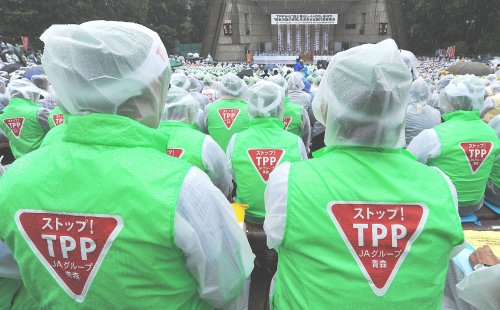Japan Today | 6 April 2016
Diet debate on TPP deal begins amid opposition
The Diet started deliberations Tuesday on a Pacific Rim free trade deal, with the ruling parties looking to have it ratified and related legislation enacted during the current session ending June 1.
During debate that started in a plenary session of the House of Representatives, measures to support farmers, who will face an influx of cheaper products from abroad under the Trans-Pacific Partnership, are expected to be a major sticking point.
Japan, the United States and 10 other countries signed the TPP accord, covering 40 percent of the global economy, in February, after reaching broad agreement on the trade framework last October.
The other participating countries are Australia, Brunei, Canada, Chile, Malaysia, Mexico, New Zealand, Peru, Singapore and Vietnam.
Prime Minister Shinzo Abe’s ruling bloc wants the Diet to ratify the pact and pass the necessary bills before the House of Councillors election this summer, while opposition parties are arguing that initially promised tariff protection for Japan’s five key farm products including rice, beef and pork is insufficient.
Abe said during the lower house plenary session that the free trade agreement “should be evaluated as being consistent with the philosophy of resolutions” adopted by Diet committees in 2013, which called for the five key products to be exempt from tariff elimination.
But Shiori Yamao, chairwoman of the main opposition Democratic Party’s policy research council, said the national interest has not been fully protected, referring to the fact that duties on about 30% of the key products will be removed.
Japan will eventually remove tariffs on 95% of farm, industrial and other imported products in value terms under the pact.
Duties on 82% of agricultural, forestry and fishery products will be abolished, while duty-free import quotas will be established for U.S. and Australian rice and tariffs on beef and pork will also be reduced substantially.
Under the deal, copyrights and trademarks will be preserved for 70 years after creators die, longer than the current 50 years in Japan, while the government is seeking to help pig and beef farmers by compensating them for any losses they incur due to stiff competition from imports.
A total of 11 laws will need to be revised in Japan for the accord. In the United States, a vote on TPP ratification is expected much later this year, given the presidential election in November.
Nobuteru Ishihara, the minister in charge of the TPP, said at a press conference earlier in the day, “It is important to build momentum” toward ratification of the pact in other countries by taking the lead in legislative procedures.
The Japanese government says the free trade deal will boost the country’s real gross domestic product by 13.6 trillion yen ($122 billion) or 2.59% from fiscal 2014, while reducing domestic output of agricultural, forestry and fishery products by 130 billion to 210 billion yen.
Opposition parties claim the impact on GDP has been overstated.
The government’s estimate “has not gained public trust,” said Mikio Shimoji of the opposition Initiatives from Osaka party.
Abe responded that the figure is “the most appropriate estimate at present.”
